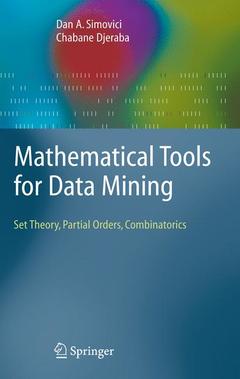Description
Mathematical tools for data mining: set theory, partials orders, combinatorics (Advances information & knowledge processing)
Authors: SIMOVICI D.A., DJERABA C.
Language: English
Subjects for Mathematical tools for data mining: set theory, partials...:
Approximative price 116.00 €
Subject to availability at the publisher.
Add to cart
Publication date: 07-2008
630 p. · Hardback
630 p. · Hardback
Description
/li>Contents
/li>Comment
/li>
The maturing of the field of data mining has brought about an increased level of mathematical sophistication. Such disciplines like topology, combinatorics, partially ordered sets and their associated algebraic structures (lattices and Boolean algebras), and metric spaces are increasingly applied in data mining research. This book presents these mathematical foundations of data mining integrated with applications to provide the reader with a comprehensive reference. Mathematics is presented in a thorough and rigorous manner offering a detailed explanation of each topic, with applications to data mining such as frequent item sets, clustering, decision trees also being discussed. More than 400 exercises are included and they form an integral part of the material. Some of the exercises are in reality supplemental material and their solutions are included. The reader is assumed to have a knowledge of elementary analysis.
Set Theory.- Set. Relation. Functions.- Algebras.- Graphs and Hypergraphs.- Partial Orders.- Partially Ordered Sets.- Lattices and Boolean Algebras.- Topologies and Measures.- Frequent Item Sets and Association Rules.- Applications to Databases and Data Mining.- Rough Sets.- Metric Spaces.- Dissimilaritie. Metrics and Ultrametrics.- Topologies and Measures on Metric Spaces.- Dimensions of Metric Spaces.- Clustering.- Combinatorics.- Combinatorics.- Combinatorics and the Vapnik-Chervonenkis Dimension.- A: Asymptotics.- B: Convex Sets and Functions.- C: A Characterization of a Function.- References.- Topic Index.
From the reviews:"The book is organized into four parts, with total of 15 chapters. Each chapter ... offers numerous exercises and references for further reading. ... Overall, Simovici and Djeraba's presentation of both the theoretical grounds and the practical aspects of the various dat mining methodologies is good. ... The book is intended for readers who have dat mining background ... . It will help this audience to improve their knowledge of how different dat mining strategies operate from mathematical standpoint." (Aris Gkoulalas-Divanis, ACM Computing Reviews, February, 2009)
© 2024 LAVOISIER S.A.S.




